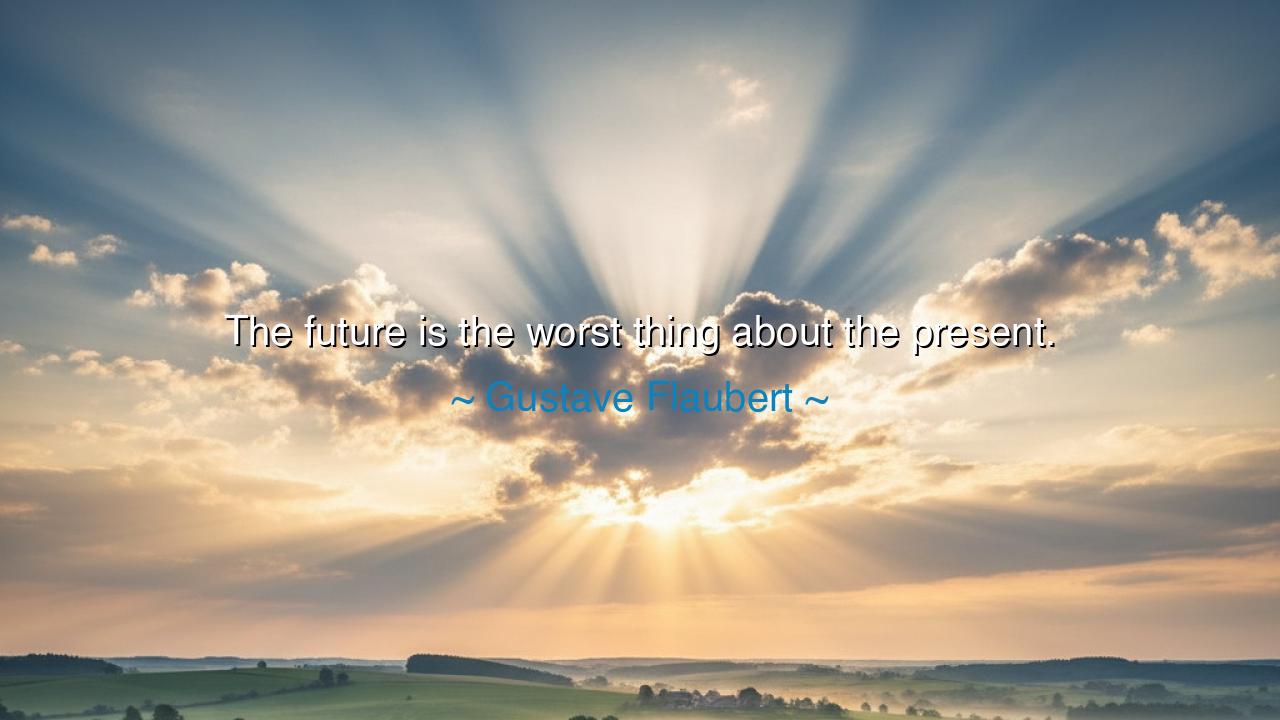
The future is the worst thing about the present.






The great French writer Gustave Flaubert, whose pen carved the truths of the human heart, once uttered these haunting words: “The future is the worst thing about the present.” To many, this may sound like despair—a lament for what lies ahead. But beneath its melancholy lies wisdom deep and enduring. Flaubert, who saw the world with the eyes of both dreamer and skeptic, understood that the shadow of the future often poisons the light of the present. It is not the moment we live in that torments us, but the endless imagining of what might come. In fearing tomorrow, we neglect today; in longing for what could be, we forget what already is.
In the manner of the ancients, let us speak plainly: the future is a mirror that deceives. It reflects not reality, but our anxieties, our desires, and our unfulfilled hopes. The human soul, restless and insatiable, looks always forward—never content, never still. Flaubert saw this as the curse of consciousness. To know that time moves and that we move with it is both a gift and a burden. The beasts of the field live without dread of tomorrow; they eat, they rest, they exist in the fullness of the hour. But we, who can imagine the days to come, tremble before them. Thus, the worst thing about the present is not hunger, nor pain, nor loneliness—it is the weight of the unknown, the heavy knowledge that all we love is fleeting.
Consider the story of Marcus Aurelius, the Roman emperor-philosopher who ruled with wisdom amid chaos. Surrounded by wars, betrayal, and the creeping decay of empire, he wrote not of conquest but of peace within the soul. In his Meditations, he warned himself daily not to be enslaved by fear of the future. He knew that to worry about what has not yet happened is to suffer twice—once in imagination, and once, perhaps, in reality. “Do not let the future disturb you,” he wrote, “for you will meet it with the same reason that guides you today.” Yet how few of us heed such counsel! Like Flaubert, Marcus saw that the future is the most merciless thief—it steals the joy of this moment before it has even arrived.
There is tragedy in this truth, but there is also liberation. To see the future as a torment is to be reminded of the sanctity of the present. For if tomorrow is uncertain, then today is sacred. Flaubert’s words, though tinged with despair, may also be read as a warning—a call to awaken. He teaches that those who live in constant anticipation of what is to come are like travelers who never set foot on the road they walk. Their eyes are fixed on the horizon, but they forget to breathe the air around them, to feel the ground beneath their feet. To live fully is to embrace the moment as it is, not as we wish it to be.
Let us recall, too, that Flaubert lived in an age of upheaval—of revolutions, inventions, and uncertainty. The world he knew was being remade by progress and politics, yet he saw that man’s inner turmoil remained unchanged. The future promised advancement, but it also brought fear. Would the soul be lost amid the machines? Would truth survive in an age of ambition? Thus, when he said, “The future is the worst thing about the present,” he spoke not only of individual worry, but of civilization itself—its endless hunger for what’s next, its inability to rest in gratitude. The disease of progress without peace is the same in every century.
O children of the new age, heed this teaching: do not let the future enslave you. The prophets of every age have warned that tomorrow belongs to no one. The only kingdom you may rule is the moment now before you. To live well is to meet the dawn without dread and the dusk without regret. Plan, yes, but do not worship your plans. Dream, but do not flee into your dreams. Let your present be full—of effort, of kindness, of meaning—for only in this moment does life truly breathe.
And so, from Flaubert’s weary wisdom we draw this lesson: the future will always come, whether we fear it or not. But the present, once lost, never returns. Therefore, live now—speak your truth now, love now, build now. Let not your days be consumed by what has not yet been written. For those who dwell always in the future are exiles from their own lives. The wise, like the ancients, live as if eternity is contained in each heartbeat, each breath, each sunrise. That is how one defeats the tyranny of time—by finding, within the fragile present, the strength to simply be.






AAdministratorAdministrator
Welcome, honored guests. Please leave a comment, we will respond soon